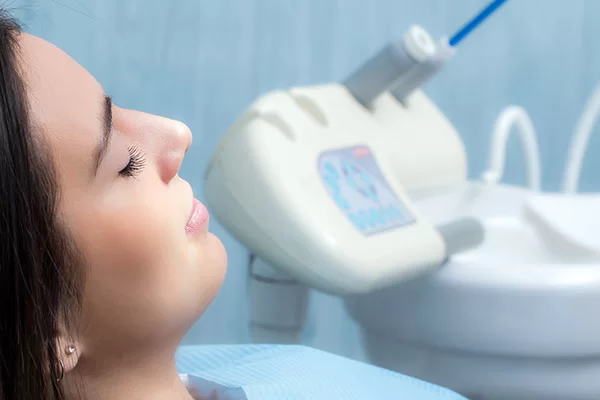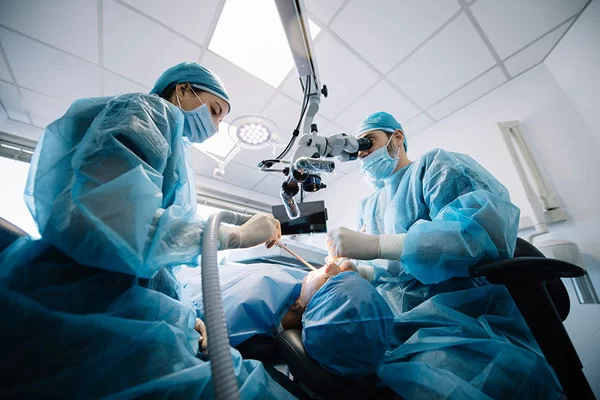General Anesthesia in Dentistry in Frisco, TX
Please note: General anesthesia is a specialized service, and we may not provide this at our office. Please call our Frisco dental office at 469.633.0550 to confirm availability and schedule a consultation.
Will You Need General Anesthesia for Dental Treatment?
The thought of a dental procedure can make anyone nervous. If you’ve been avoiding the dentist due to severe dental anxiety, a sensitive gag reflex, or the need for complex dental surgery, you’re not alone. For residents in Frisco, Little Elm, and Prosper, modern dentistry offers a powerful solution: general anesthesia.
This guide will walk you through everything you need to know about undergoing general anesthesia right here in Frisco, ensuring you feel informed and confident in your dental care decisions.
If you need to see a dentist, schedule an appointment with Dr. Christopher Probst or Dr. Jiaying Ren at our Frisco, TX, dental office by calling 469.633.0550.
What is General Anesthesia in Dentistry?
General anesthesia is a medically controlled state of unconsciousness used for certain dental treatments. Unlike local anesthesia (which numbs a specific area) or oral conscious sedation (where you’re relaxed but awake), general anesthesia makes you “completely unconscious” and unaware during the procedure.
A qualified anesthesiologist or nurse anesthetist administers medication, typically through an IV, and continuously monitors your vital signs, including your heart rate and blood pressure, throughout your treatment.
Is General Anesthesia the Right Choice for Your Dental Care?
Our dental practice may recommend, or you might consider, general anesthesia for several reasons:
- Complex Oral Surgery: Procedures like wisdom teeth extractions, multiple dental implants placement, or jaw surgery are often lengthy and invasive.
- Severe Dental Anxiety or Phobia: If the idea of a dental appointment causes intense fear, general anesthesia provides a “pain-free experience” where you sleep through the entire dental work.
- Special Needs Patients: Both children and adults with physical, cognitive, or behavioral challenges can receive comprehensive dental care safely and comfortably.
- Extensive Dental Procedures: When you need a significant amount of dental work completed, combining it into one appointment under anesthesia means fewer appointments and a faster path to a healthy smile.
- A Strong Gag Reflex: For those with a sensitive gag reflex, which can make even simple procedures difficult, general anesthesia eliminates this concern entirely.
What to Expect When Administering General Anesthesia
Step 1: Thorough Patient Evaluation
Your safety is our top priority. Before any dental treatment, our dental team will conduct a comprehensive review of your medical history, including any medical conditions, current medications, and previous experiences with anesthesia. This ensures you’re a good candidate.
Step 2: Preparation and Anesthesia Induction
You will be instructed to fast for several hours before your appointment. In our office, our anesthesia team will make you comfortable before administering the anesthetic through an IV. You’ll gently drift into a deep sleep (“twilight sleep” is a lighter sedation, so we clarify you will be fully unconscious) before any dental procedures begin.
Step 3: Continuous Monitoring During Your Procedure
Throughout your treatment, the anesthesia provider’s sole focus is on your well-being. They will continuously monitor your vital signs—including heart rate, blood pressure, and oxygen levels—ensuring you remain stable and comfortable.
Step 4: Waking Up and Post-Anesthesia Care
After the procedure is complete, the medications are stopped, and you’ll wake up in a recovery area. It’s normal to feel groggy for a few hours. Because of the effects of the dental sedation, you must have a trusted person drive you home. We will provide clear aftercare instructions to manage your recovery time.
Treatments Where General Anesthesia Dentistry May Be Used in Frisco
When it comes to your oral health, certain situations require a level of comfort and cooperation that only general anesthesia can provide. At our dental practice in Frisco, we consider this option for a range of complex or anxiety-inducing dental procedures to ensure a pain-free experience.
Complex Oral and Jaw Surgery
For invasive oral surgery, being completely still is crucial for safety and precision. General anesthesia is commonly used for:
- Wisdom Teeth Extraction: Removing impacted or deeply rooted wisdom teeth is a common dental surgery that benefits greatly from anesthesia.
- Jaw Surgery (Orthognathic Surgery): Correcting significant jaw misalignments is a lengthy procedure where anesthesia ensures patient comfort and stability.
- Facial Trauma Repair: Treating complex fractures of the jaw or facial bones often requires the patient to be completely unconscious.
Advanced Dental Implant Procedures
Placing a single dental implant may only require local anesthesia. However, for full-arch replacements like All-on-4® or multiple dental implants in one session, general anesthesia makes the process comfortable and efficient, transforming your smile in fewer appointments.
Pediatric Dentistry and Special Needs Care
Some children, especially those with special needs or extreme dental fear, can’t tolerate the sounds and sensations of a dental appointment. General anesthesia allows our dentists to safely complete all necessary dental work—from dental fillings to dental crowns—in one visit, preventing a lifetime of dental anxiety.
Extensive Restorative Dental Work
If you need a significant amount of dental treatment to restore your oral health, such as multiple root canals, crowns, and tooth extractions, performing it all in one session under anesthesia is often the best choice. This approach minimizes stress and gets you back to smiling confidently faster.
Managing Extreme Dental Phobia and Sensitivities
For our patients in Frisco with severe dental anxiety or a strong gag reflex, even a cleaning can be impossible. General anesthesia provides a definitive solution, allowing you to receive essential dental care in a state of peaceful sleep, completely bypassing fear and discomfort.
Understanding the Risks of General Anesthesia
While modern general anesthesia is exceptionally safe when administered by a trained anesthesiologist or nurse anesthetist, it’s a major medical intervention. It’s crucial to be informed of the potential risks, which is why a thorough review of your medical history is our first step.
Common, Typically Minor Side Effects
Many patients experience some temporary effects as the anesthetic wears off. These are normal and part of the recovery time:
- Nausea and vomiting
- Grogginess or dizziness (You will need a ride home and should not drive for 24 hours)
- A sore throat (from the breathing tube placed to help you breathe)
- Shivering or feeling cold
Less Common, More Serious Risks
Our dental team is trained and equipped to prevent and manage these potential complications. We continuously monitor your vital signs—including blood pressure, heart rate, and oxygen levels—throughout the procedure to ensure your well-being.
- Allergic Reactions: While rare, a patient can have an allergic reaction to the medications used.
- Respiratory Problems: There is a small risk of breathing difficulties during or after the procedure.
- Cardiovascular Complications: Changes in blood pressure or heart rate can occur.
- Aspiration: This is when stomach contents are inhaled into the lungs. This is why fasting before your appointment is critical.
The Importance of Your Medical History
The most significant factor in minimizing risk is an honest and complete discussion of your health. Be sure to disclose all medical conditions, medications (prescription and over-the-counter), and any history of allergic reactions to your healthcare providers. This allows our team to create the safest possible anesthesia plan for you.
Understanding the Costs and Your Dental Insurance
The cost of general anesthesia can vary, typically ranging from $400 to $1,000 per hour, depending on the length and complexity of your dental procedures. Factors include the anesthesiologist’s fees and the specific requirements of your case.
We understand that cost is a concern. Our dental office in Frisco will provide a clear breakdown of fees and help you understand your dental insurance coverage. Many plans provide partial coverage for general anesthesia when it’s deemed medically necessary for complex oral surgery or for patients with specific medical conditions.
Sedation Dentistry Options: Is There an Alternative?
General anesthesia is just one of the sedation options we discuss with our patients. For those with milder anxiety, other sedation methods can be highly effective:
- Nitrous Oxide(“Laughing Gas”): A mild sedative you breathe through a mask. It helps you relax while you remain fully conscious. The effects wear off quickly, allowing you to drive yourself home.
- Oral Conscious Sedation: You take a prescribed medication before your appointment, leading to a state of deep relaxation (moderate sedation). You are still awake but profoundly calm.
- IV Sedation(Deep Sedation): Medication is delivered intravenously, allowing for a deeper level of sedation than oral medication. You may sleep through the procedure, but you can be easily awakened.
Frequently Asked Questions
How do I find a dentist near me in Frisco who offers general anesthesia?
Start by calling our dental office at469.633.0550. While not all general dentists offer this in-office, we can coordinate with specialized healthcare providers to facilitate your care or guide you to the right specialist in the North Dallas area.
Are the risks of general anesthesia different in a dental office versus a hospital?
The standards of safety are the same. Our dental practice is equipped with the same emergency medications, monitoring equipment, and trained professionals (like nurse anesthetists or dental anesthesiologists) to ensure your safety. A thorough preoperative health screening is key.
What are the most common side effects after general anesthesia?
Most side effects are mild and short-lived. It’s common to experience grogginess, a sore throat (from the breathing tube), or mild nausea. These symptoms usually resolve within a few hours.
My child has special needs and requires extensive dental work. Is this an option for pediatric patients in Frisco?
Absolutely. General anesthesia is often used in pediatric dentistry to ensure children, especially those with special needs, receive safe, compassionate, and comprehensive dental care without fear or trauma.
Ready for a Calmer, Pain-Free Dental Experience? Schedule Now!
You don’t have to let fear or complex dental needs stand in the way of a healthy smile. Our Frisco dental team is here to provide the information and compassionate care you deserve.
Contact our dental practice in Frisco today at 469.633.0550 to discuss your sedation options and learn how we can create a comfortable, anxiety-free dental experience for you. We proudly welcome patients from Frisco, Little Elm, Prosper, Celina, The Colony, and all surrounding North Texas communities.





